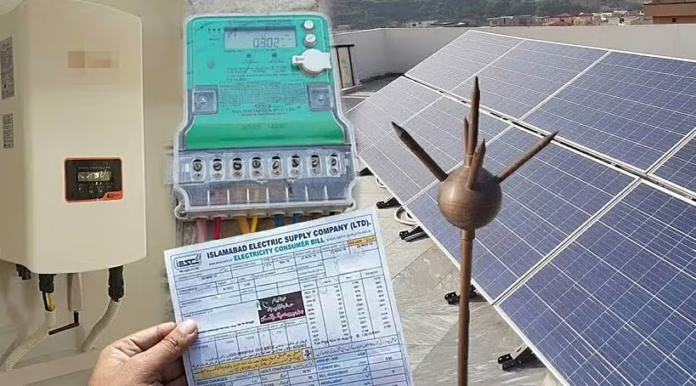ISLAMABAD: The Economic Coordination Committee (ECC) of the Cabinet has approved a set of amendments to the existing net-metering regulations aimed at reducing the growing financial burden on grid consumers.
The decision comes in response to a significant increase in the number of solar net-metering consumers, which has financial implications for grid consumers.
As per details, as part of the approved changes, the ECC, which met here under the chairmanship of Federal Minister for Finance and Revenue Senator Muhammad Aurangzeb on Thursday, has revised the buyback rate from the National Average Power Purchase Price (NAPP) to Rs. 10 per unit. Furthermore, the committee authorized the National Electric Power Regulatory Authority (NEPRA) to periodically revise this buyback rate, ensuring that the framework remains adaptable to evolving market conditions.
However, it was clarified that the revised framework will not apply to existing net-metered consumers with a valid license, concurrence, or agreement under the NEPRA (Alternative & Renewable Energy) Distributed Generation and Net Metering Regulations, 2015. These agreements will remain effective until the expiration of the license or agreement, ensuring the continuity of agreed-upon rates and obligations.
Additionally, the ECC approved an update to the settlement mechanism. Under the new structure, imported and exported units will be treated separately for billing purposes. Exported units will be purchased at the revised buyback rate of Rs. 10 per unit, while imported units will be billed at the applicable peak/off-peak rates, inclusive of taxes and surcharges, during the monthly billing cycle.
The ECC also authorized the Power Division to issue proposed guidelines, subject to Cabinet ratification, to NEPRA for incorporation into the applicable regulatory framework. This ensures clarity and consistency in implementing these amendments. The decision follows extensive discussions on the impact of solar net-metering on the national power grid.
The Power Division emphasized the need for regulatory adjustments, citing a record decline in solar panel prices that has led to a sharp increase in the number of solar net-metering consumers. As of December 2024, solar net-metering consumers had transferred a burden of Rs. 159 billion to grid consumers, a figure projected to rise to Rs. 4,240 billion by 2034 without timely amendments.
The ECC was informed that the number of solar net-metering consumers surged significantly, reaching 283,000 by December 2024, up from 226,440 in October 2024. The total installed capacity also grew from 321 MW in 2021 to 4,124 MW by December 2024, underscoring the rapid expansion of the net-metering sector. However, the increase in solar net-metering consumers has contributed to rising electricity costs for grid consumers, undermining the government’s efforts to reduce power tariffs.
The ECC also discussed the financial implications of the growing number of solar net-metering consumers, particularly their avoidance of fixed tariff charges, including capacity charges and the fixed expenditures of power distribution and transmission entities. This has transferred a disproportionate financial burden onto grid consumers, contributing to higher electricity tariffs and affecting the sustainability of the energy sector.
The committee further noted that 80% of solar net-metering consumers are concentrated in nine major cities, with a significant proportion in affluent areas. This geographical concentration underscores the need for regulatory reforms to ensure fairness and balance in the energy distribution system.
The amendments approved by the ECC represent a crucial step toward ensuring the sustainability of the power sector while protecting the interests of all consumers, particularly those relying on the grid for electricity.
The meeting was attended by Minister for Power Sardar Awais Ahmed Khan Leghari, Minister for Maritime Affairs Qaiser Ahmed Sheikh, Minister for Petroleum Ali Parvez Malik, along with federal secretaries and senior officials from relevant ministries and divisions.




